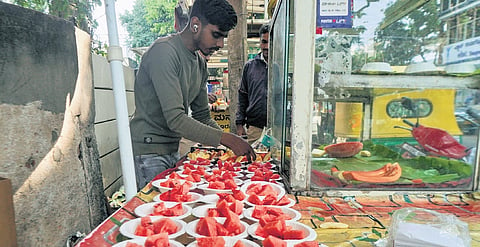

BENGALURU: With temperatures soaring across Karnataka, the Health Department will begin tracking and monitoring heatstroke cases from this month.
Health officials told TNIE that to ensure immediate treatment, a few of the existing facilities will be converted into special heatstroke treatment rooms which will be set up in taluk hospitals, with a particular focus on Dakshina Kannada, where the mercury has already crossed 40 degrees Celsius.
These air-conditioned rooms will be equipped with essential medicines, fans, and emergency supplies. Specialist doctors have been put on alert, and the district health officers (DHOs) are expected to hold review meetings with taluk health officials to enforce all precautionary measures, a health official said.
Meanwhile, a senior health official said that so far, no cases of heatstroke have been reported in Karnataka. Authorities, however, are taking precautionary measures, with doctors at all taluk hospitals being instructed to remain on high alert, the official added.
“Heatstroke cases are reported when body temperature exceeds 40 degrees celsius. Last year, the majority of the heat-related illness cases of the total cases - over 600 - reported in Karnataka were only heat rashes and sunburns.
The Health Department has already released a heat advisory advising the public to maintain the hydration level and avoid stepping out between 12 noon and 3 pm,” the official said.
Summer Advisory
Stay hydrated – Drink plenty of water, even if not thirsty
Recognise warning signs – Watch for symptoms like dizziness, excessive sweating, nausea, or confusion, and seek medical help immediately
Check on vulnerable groups – Ensure children, elderly people, and those with medical conditions stay cool, hydrated
Eat light, nutritious meals – Consume hydrating foods like fruits, salads, and yogurt. Avoid heavy, hot, or spicy food
Wear light clothing – Opt for loose, light-coloured, breathable fabrics
Avoid going out during peak heat hours (12 pm – 4 pm). If necessary, use an umbrella, hat, or sunglasses